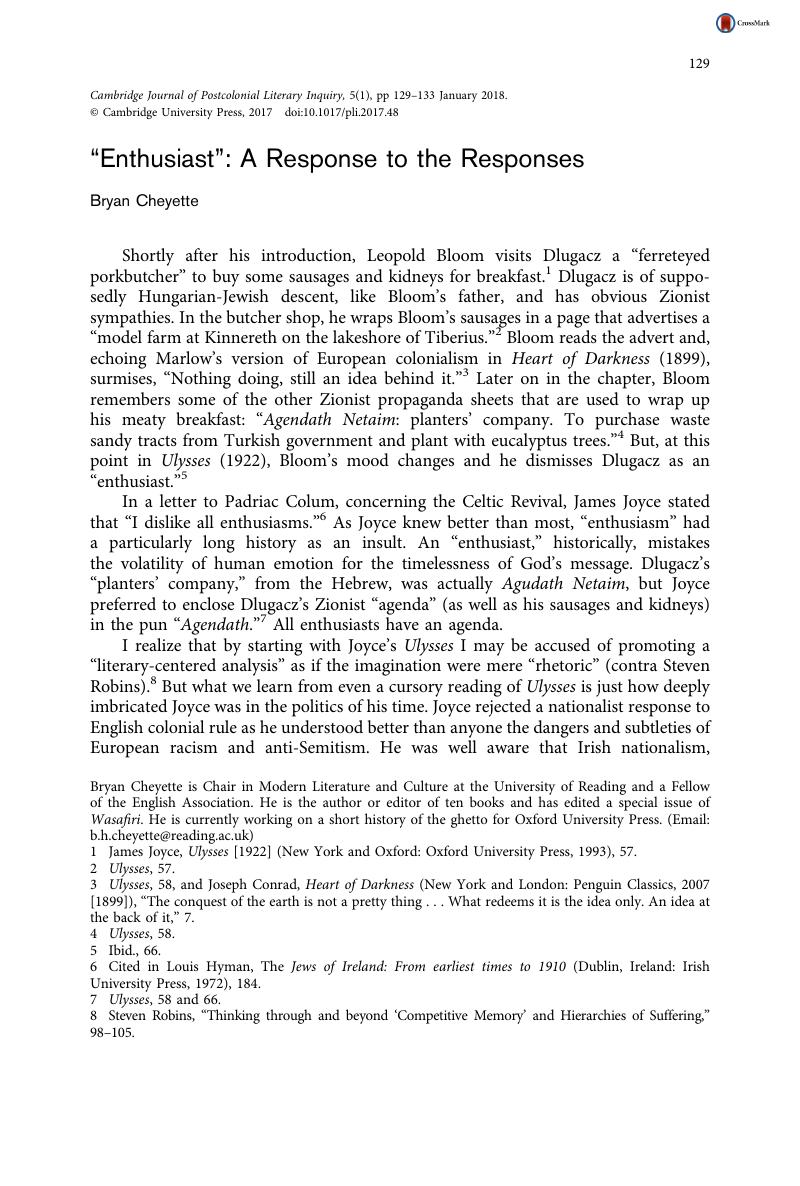No CrossRef data available.
Article contents
“Enthusiast”: A Response to the Responses
Published online by Cambridge University Press: 05 January 2018
Abstract

- Type
- Opinion Paper (Paradigm Response)
- Information
- Cambridge Journal of Postcolonial Literary Inquiry , Volume 5 , Issue 1 , January 2018 , pp. 129 - 133
- Copyright
- © Cambridge University Press 2017
References
1 Joyce, James, Ulysses [1922] (New York and Oxford: Oxford University Press, 1993), 57 Google Scholar.
2 Ulysses, 57.
3 Ulysses, 58, and Conrad, Joseph, Heart of Darkness (New York and London: Penguin Classics, 2007 [1899])Google Scholar, “The conquest of the earth is not a pretty thing . . . What redeems it is the idea only. An idea at the back of it,” 7.
4 Ulysses, 58.
5 Ibid., 66.
6 Cited in Hyman, Louis, The Jews of Ireland: From earliest times to 1910 (Dublin, Ireland: Irish University Press, 1972), 184 Google Scholar.
7 Ulysses, 58 and 66.
8 Steven Robins, “Thinking through and beyond ‘Competitive Memory’ and Hierarchies of Suffering,” 98–105.
9 Nils Roemer, “On Cheyette,” 123–128. For this argument in full see Bryan Cheyette, Constructions of “the Jew” in English Literature and Society: Racial Representations 1875–1945 (New York and Cambridge: Cambridge University Press, 1995), chapter six.
10 Michael Rothberg, “For Activist Thought: A Response to Bryan Cheyette,” 115–122.
11 Vivek Freitas, “Writing in Inclement Weather: The Dialectics of Comparing Minority Experiences in Threatening Environments,” 106–114.
12 “Against Supersessionist Thinking: Old and New, Jews and Postcolonialism, the Ghetto and Diaspora,” 425.
13 “My Right of Return,” interview with Ari Shavit, Ha’aretz Magazine, Tel Aviv (2000), in Power, Politics and Culture: Interviews with Edward W. Said, ed. Gauri Viswanathan (New York: Pantheon, 2001), 443–58. Viswanathan has confirmed (in conversation) that Edward Said insisted on this being the last interview (and last word) in her collection.
14 For an extended version of this argument see Cheyette, Bryan, “A Glorious Achievement: Edward Said and the Last Jewish Intellectual,” Edward Said’s Translocations: Essays in Secular Criticism, eds. Tobias Döring and Mark Stein (London and New York: Routledge, 2012)Google Scholar, chapter four.
15 The use of the term fascist is ubiquitous in the United States after the election of President Donald Trump with openly White Supremacist and neo-Nazi supporters. But fascism remains a word that signifies everything and nothing as can be seen, for example, in two recent misguided accounts: Goldberg, Jonah, Liberal Fascism: The Secret History of the Left from Mussolini to the Politics of Meaning (New York: Doubleday, 2007)Google Scholar and Abdel-Samad, Hamed, Islamic Fascism (New York: Prometheus, 2016)Google Scholar.
16 Rothberg, “For Activist Thought,” 115–122.
17 Jonathan, and Boyarin, Daniel, Powers of Diaspora: Two Essays on the Relevance of Jewish Culture (Minneapolis, MN: University of Minnesota Press, 2002)Google Scholar. For a compelling reading of Joyce’s politics see Gibson, Andrew, James Joyce (London: Reaktion, 2006)Google Scholar.
18 John McLeod, “Figuring and Transfiguring: A response to Bryan Cheyette,” 90–97. See also Bryan Cheyette, Diasporas of the Mind: Jewish/Postcolonial Writing and the Nightmare of History (New Haven, CT: Yale University Press, 2014), chapter one.
19 McLeod, 90–97, and see also Gregory, Derek, The Colonial Present: Afghanistan, Palestine, Iraq (Oxford: Blackwell, 2004)Google Scholar and Brah, Avtar, Cartographies of Diaspora: Contesting Identities (London: Routledge, 1996)Google Scholar.
20 Robins, “Thinking through and beyond,” 98–105, and Fanon, Frantz, The Wretched of the Earth, trans. Constance Farrington (New York: Grove Press, 1963), 167 Google Scholar. See also Cheyette, Diasporas of the Mind, chapter two for a longer version of this argument.
21 Levi, Primo, The Periodic Table, trans. Raymond Rosenthal (New York: Schocken Books, 1984), 139–140 Google Scholar.
22 Levi, Primo, The Drowned and the Saved, trans. Raymond Rosenthal (New York: Simon & Schuster, 1988), 63 Google Scholar.
23 Levi, The Drowned and the Saved, 32, and Rothberg, “For Activist Thought,” 115–122.
24 Biale, David, Power and Powerlessness in Jewish History (New York: Schocken, 1986)Google Scholar.
25 Traveso, Enzo, The End of Jewish Modernity, trans. David Fernbach (London: Pluto Press, 2016)Google Scholar.
26 I am aware that although many of the subjects in these responses concern the lives of women this is a discussion among men. For an alternative discussion, see Casteel, Sarah, Calypso Jews: Jewishness in the Caribbean Imagination (New York: Columbia University Press, 2016)Google Scholar; Guttman, Anna, Writing Indians and Jews: Metaphorics of Jewishness in South Asian Literature (London and New York: Palgrave 2013)CrossRefGoogle Scholar; and Hesse, Isabelle, The Politics of Jewishness: The Holocaust, Zionism, and Colonialism in Contemporary World Literature (London and New York: Bloomsbury, 2016)Google Scholar.
27 Rothberg, “For Activist Thought,” 115–122.
28 See, for instance, my recent intervention “English Literature Saved My Life,” Brexit and Literature: Critical and Cultural Responses, ed. Robert Eaglestone (London and New York: Routledge, 2018). See also “100 Years after Balfour” https://youtu.be/a2Y3Pllutjo by Independent Jewish Voices.


